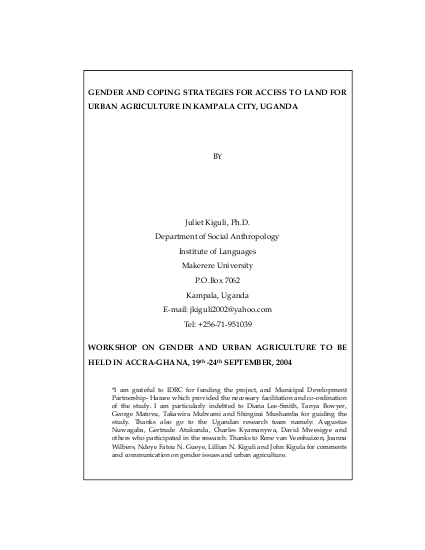
This case study reflects on the importance of urban agriculture in Kampala City, which area policy makers and authorities have neglected yet it has a direct bearing on the economy. Urban agriculture ensures food security to city dwellers. It is also a thriving livelihood which empowers both women and men, especially those in poor households. Many retrenched or retired civil servants and other unemployed persons as a result of structural adjustment programme impact in the 1980s perceive it as a form of social security and pension. Also, conventional science based research and extension services focussing on modern agriculture target only the rural households, leaving out the city. Still, sociomanagement of land is ignored, although it affects agricultural productivity. The case study looks at land which is a vital resource to practising agricultural activities. It spell outs the patriarchal tenure relations which affect women, who are the majority of urban farmers and make them lack access to land and ownership rights. Ultimately, people lack productive and household assets, which leads to urban poverty. So urban poverty is indicated as an urgent issue to be addressed and realised as many policies and development work focus on the rural areas yet rural - urban migration influx is high and continues to perplex modernisation in the city.
Resource collections
- Accountability to affected populations (AAP)
- Evaluating humanitarian action
- Topics
- UN Habitat - Urban Response Collection
- Urban Response - Urban Crisis Preparedness and Risk Reduction
- Urban Response Collection - Community Engagement and Social Cohesion
- Urban Response Collection - Economic Recovery
- Urban Response Collection - Environment and Climate Change
- Urban Response Collection - Housing, Land and Property
- Urban Response Collection - Urban Crisis Response, Recovery and Reconstruction
- Urban Response Collection - Urban Resilience
